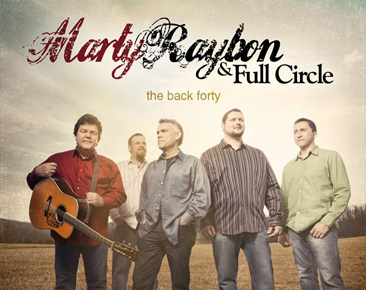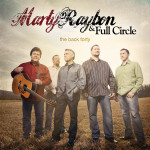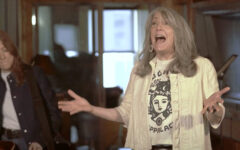
 Like the name of his band, Marty Raybon has come Full Circle. From starting out as part of a bluegrass family band with his brothers in the early ‘70s, to riding the wave at the top of country music fame with his group Shenandoah to releasing music with his brother Tim, Marty has come back to his bluegrass roots in recent years. It might not seem possible, especially to his loyal fans, but Raybon is celebrating 40 years in entertainment in 2013. Given such a momentous occasion, a true achievement for any artist by any standards, he has released The Back Forty, a new 10-song collection he produced for Rural Rhythm Records with his Full Circle band.
Like the name of his band, Marty Raybon has come Full Circle. From starting out as part of a bluegrass family band with his brothers in the early ‘70s, to riding the wave at the top of country music fame with his group Shenandoah to releasing music with his brother Tim, Marty has come back to his bluegrass roots in recent years. It might not seem possible, especially to his loyal fans, but Raybon is celebrating 40 years in entertainment in 2013. Given such a momentous occasion, a true achievement for any artist by any standards, he has released The Back Forty, a new 10-song collection he produced for Rural Rhythm Records with his Full Circle band.
The album leans towards a traditional sound while still sounding contemporary. Sometimes, as on Only You, Only You, the sound is even reminiscent of the early-90’s country sound that initially made Raybon and Shenandoah so popular during that explosive era. Chatting during a recent listening party held at the new IBMA offices in Nashville, he explained that his intention for the record was to record a bluegrass album, while acknowledging that sometimes, nowadays the term “bluegrass” isn’t always particularly clear.
“I think if people are allowed to be a part of something, it’s not necessary that they have to be labeled,” he says with conviction. “Everybody wants [bluegrass music] to grow, but they want to micromanage it – ‘We don’t like that. You can do this, but we don’t like that.’ I think that’s very unfair. You wouldn’t have the Infamous Stringdusters. You wouldn’t have ever even had the Newgrass Revival. You wouldn’t have had Sam Bush or John Cowan, but if you ask people what they think about them, they love them.”
“Don’t take stuff away from people that they want. What they want is what they want to hear, what they buy is what they want to buy. You can’t make people like you, you just do what you do and hope you get to have a run at it. But to limit what bluegrass is or isn’t? I don’t think there should be a limit. I don’t think it’s fair to the artists, and I don’t think it’s fair to the fans, especially.”
With his aversion to labeling music in mind, then, one might describe The Back Forty as both a nod to where he’s been while resolutely looking ahead to where he’s going. Some will recognize the title character in the kick-off tune, That Janie Baker, as the focus of a Shenandoah hit from 1993 titled Janie Baker’s Love Slave. Making this and other similar connections on The Back Forty were Raybon’s way of paying homage to his successful past while bringing it into his present, melding the two together into one cohesive, consistent career.
The album certainly reflects the artist the Raybon has refined himself into in recent years. That is, he remains a very active songwriter, and contributes half of the tracks to the new record. He has taken the producer’s chair, defining and shaping his sound into precisely what he desires for himself. The kinds of songs included reflect this, as in the aforementioned Janie Baker, a look at old country’s Slowly (I’m Falling), written by Webb Pierce and Tommy Hill, the Gospel Look for Me (For I Will Be There Too), by Rusty Goodman of The Happy Goodman Family and the top-tapper Mountain Love, which shows off some impressive fiddle from Tim Crouch. Raybon’s brother, also Tim, contributes powerfully with outstanding harmony vocal work, sometimes placed high in the mix to great effect. It’s a comfortable album that Raybon’s longtime fans are going to thoroughly enjoy, and he’s looking forward to picking up new fans along the way as he and Full Circle hit the road this traveling season.
“People understand that you [the bands] love it,” he says. “People say that ‘You can’t make any money playing bluegrass music.’ Well, then why do we do it? If it costs us money, why do we do it? Because we love it. That’s why you’re willing sometimes to pay $160 in gas to go play a $75 gig! It’s the camaraderie, it’s the fellowship, it’s the companionship of having someone that literally has the same frame of mind that you do.”
“Everybody that pulls into a bluegrass festival, they might not know each other from Adam’s housecat, but everybody that pulled past that ticket gate has one thing in common – the love for the music.”
Writing songs remains an outlet of expression for Raybon for his music and his heart, and he can’t imagine not contributing to his work in that way.
“A lot of things have happened in the 40 years since I started,” he notes. “When we first started out, we might not have had as much to say, or know what to write about. But now, we take what wants to be said and what needs to be said, and hopefully what we’ve done is matured in life so that our stories, though they’re maybe the same things happening to us, or not, we can share them in a much bigger way. What happens is, we can open up and share a little bit more of our heart. I believe people genuinely love genuineness, and I believe that they can identify with it very quickly. So we try to write about real things in real ways.”
In looking back over a long and storied career that anybody would only hope to dream about, Raybon realizes his good fortune, and does not take it lightly or for granted.
“Look, I literally am blessed more than I deserve, blessed and highly favored, and it’s only because of God and what He does. It’s what He’s allowed for us. That is the truth.
“I’ll put it this way – if the next 40 years can be as good as the last, I’ll be doing pretty good. I’d be tickled to death about it, actually.”







